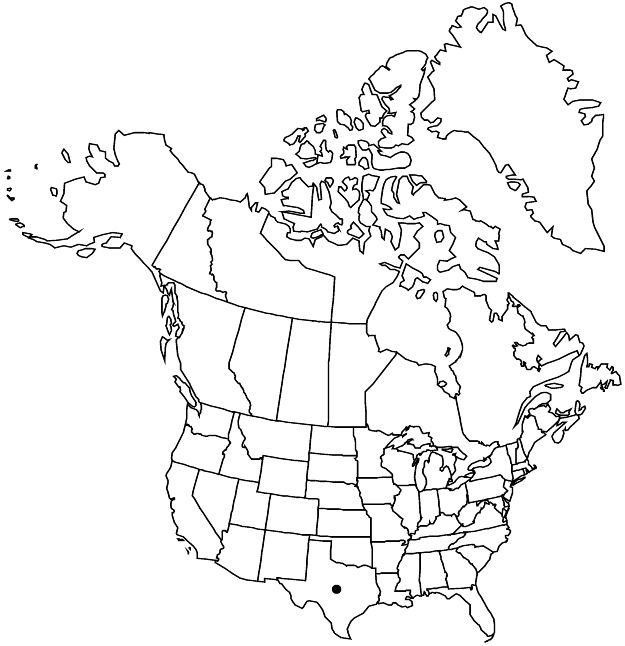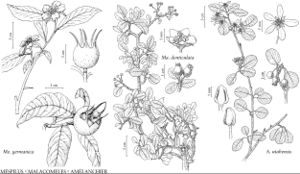Difference between revisions of "Malacomeles denticulata"
Fl. Serres Jard. Paris 23: 156. 1882.
Common names: Big Bend serviceberry southern false serviceberry
Illustrated
Basionym: Cotoneaster denticulatus Kunth in A. von Humboldt et al., Nov. Gen. Sp. 6(fol.): 169
Synonyms: Undefined 6(qto.) : 214 Undefined plate 556. 1824 (as denticulata) Amelanchier denticulata (Kunth) K. Koch
Treatment appears in FNA Volume 9. Treatment on page 646.
FNA>Volume Importer |
imported>Volume Importer |
||
| (6 intermediate revisions by 2 users not shown) | |||
| Line 10: | Line 10: | ||
|special_status={{Treatment/ID/Special_status | |special_status={{Treatment/ID/Special_status | ||
|code=F | |code=F | ||
| − | |label= | + | |label=Illustrated |
}} | }} | ||
| − | |basionyms={{Treatment/ID/ | + | |basionyms={{Treatment/ID/Basionym |
|name=Cotoneaster denticulatus | |name=Cotoneaster denticulatus | ||
|authority=Kunth | |authority=Kunth | ||
| + | |rank=species | ||
| + | |publication_title=in A. von Humboldt et al., Nov. Gen. Sp. | ||
| + | |publication_place=6(fol.): 169 | ||
}} | }} | ||
|synonyms={{Treatment/ID/Synonym | |synonyms={{Treatment/ID/Synonym | ||
|name=Undefined 6(qto.) | |name=Undefined 6(qto.) | ||
|authority=: 214 | |authority=: 214 | ||
| − | }}{{Treatment/ID/Synonym | + | |rank=species |
| + | }} {{Treatment/ID/Synonym | ||
|name=Undefined plate | |name=Undefined plate | ||
|authority=556. 1824 (as denticulata) | |authority=556. 1824 (as denticulata) | ||
| − | }}{{Treatment/ID/Synonym | + | |rank=species |
| + | }} {{Treatment/ID/Synonym | ||
|name=Amelanchier denticulata | |name=Amelanchier denticulata | ||
|authority=(Kunth) K. Koch | |authority=(Kunth) K. Koch | ||
| + | |rank=species | ||
}} | }} | ||
|hierarchy=Rosaceae;Rosaceae subfam. Amygdaloideae;Rosaceae tribe Gillenieae;Malacomeles;Malacomeles denticulata | |hierarchy=Rosaceae;Rosaceae subfam. Amygdaloideae;Rosaceae tribe Gillenieae;Malacomeles;Malacomeles denticulata | ||
| Line 40: | Line 46: | ||
|elevation=(500–)800–1700 m | |elevation=(500–)800–1700 m | ||
|distribution=Tex.;Mexico;Central America (Guatemala). | |distribution=Tex.;Mexico;Central America (Guatemala). | ||
| − | |discussion=<p>Malacomeles denticulata is a xerophytic shrub with small leaves and flowers. The species is found in the flora area only in trans-Pecos Texas.</p> | + | |discussion=<p><i>Malacomeles denticulata</i> is a xerophytic shrub with small leaves and flowers. The species is found in the flora area only in trans-Pecos Texas.</p> |
|tables= | |tables= | ||
|references= | |references= | ||
| Line 49: | Line 55: | ||
-->{{#Taxon: | -->{{#Taxon: | ||
name=Malacomeles denticulata | name=Malacomeles denticulata | ||
| − | |||
|authority=(Kunth) Decaisne | |authority=(Kunth) Decaisne | ||
|rank=species | |rank=species | ||
| Line 63: | Line 68: | ||
|publication title=Fl. Serres Jard. Paris | |publication title=Fl. Serres Jard. Paris | ||
|publication year=1882 | |publication year=1882 | ||
| − | |special status= | + | |special status=Illustrated |
| − | |source xml=https:// | + | |source xml=https://bitbucket.org/aafc-mbb/fna-data-curation/src/2e0870ddd59836b60bcf96646a41e87ea5a5943a/coarse_grained_fna_xml/V9/V9_1112.xml |
|subfamily=Rosaceae subfam. Amygdaloideae | |subfamily=Rosaceae subfam. Amygdaloideae | ||
|tribe=Rosaceae tribe Gillenieae | |tribe=Rosaceae tribe Gillenieae | ||
Latest revision as of 22:54, 5 November 2020
Leaves: stipules 1 mm; petiole 2–4(–10) mm; blade 0.5–1.5 × 0.3–1 mm, base cuneate to rounded or truncate, margins: teeth 4–8 per side, apex truncate to rounded or acute to mucronate. Bracts persistent, lanceolate, ciliate. Pedicels 2–7(–9) mm. Flowers: sepals 1.6 × 2.8 mm, ciliate; petals 2.5–5.5 mm. Pomes edible, insipid.
Phenology: Flowering spring; fruiting summer.
Habitat: Talus slopes, canyons, on limestone and igneous substrates
Elevation: (500–)800–1700 m
Distribution

Tex., Mexico, Central America (Guatemala).
Discussion
Malacomeles denticulata is a xerophytic shrub with small leaves and flowers. The species is found in the flora area only in trans-Pecos Texas.
Selected References
None.
Lower Taxa
None.
